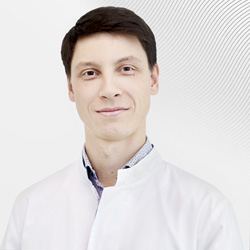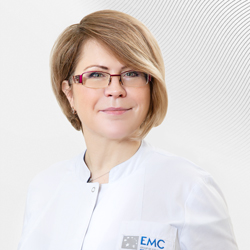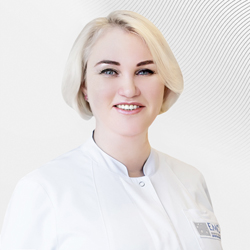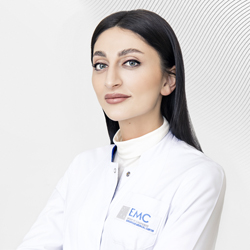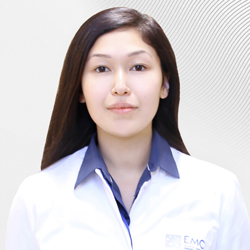
Anesthesiology, critical care and intensive care; inpatient hospital
Inpatient department
The multidisciplinary inpatient departments of the clinics at Shepkina St., Orlovsky Pereulok and Spiridonevsky Pereulok work around the clock, which allows us to perform scheduled and emergency general surgical, oncological, oral and maxillofacial, traumatological, orthopedic, gynecological, urolgical, proctological, ophthalmologic, otolaryngologic, neurosurgical and plastic surgical operations. The operating rooms at EMC are equipped with the most modern medical equipment and fully comply with the accepted standards of leading Western European and United States clinics.
Inpatient Rooms
The clinic offers comfortable inpatient single and double rooms, which are equipped with beds that have individual adjustable settings, a wardrobe, a TV set with satellite channels in multiple languages, a call button for medical staff (which also includes functions for the phone and radio), free Wi-Fi and an individual safe. If desired, patients can take advantage of a bathrobe, slippers and toiletries provided by EMC. In addition, all patient rooms are equipped with installations for individual oxygen supply.
The clinic offers comfortable inpatient single and double rooms, which are equipped with beds that have individual adjustable settings, a wardrobe, a TV set with satellite channels in multiple languages, a call button for medical staff (which also includes functions for the phone and radio), free Wi-Fi and an individual safe. If desired, patients can take advantage of a bathrobe, slippers and toiletries provided by EMC. In addition, all patient rooms are equipped with installations for individual oxygen supply.
Inpatient Meals
For patients undergoing treatment in the hospital, EMC provides 4 meals a day. One of the basic principles of clinical nutrition is adhering to a balanced diet, namely a certain ratio of proteins, fats, carbohydrates, vitamins, minerals and water in the right proportions for the human body.
For patients undergoing treatment in the hospital, EMC provides 4 meals a day. One of the basic principles of clinical nutrition is adhering to a balanced diet, namely a certain ratio of proteins, fats, carbohydrates, vitamins, minerals and water in the right proportions for the human body.
Diet is one of the most important treatments for many diseases, and for some it is a major treatment. Clinical nutrition is important not only in the proper selection of products, but also with respect to cooking techniques and frequency and timing of meals.
Meals in the hospital are organized in strict accordance with the treating physician, and depending on the diagnosis. In prescribing the diet the nature of the disease is taken into account, the degree of function of various organs, and accordingly appropriate changes are made with regard to excluding certain products and/or making changes in cooking techniques.
If the patient has food preferences, the menu can be discussed with the treating physician. In cases where the patient is assigned a general diet with no restrictions, it is possible to order food delivery from restaurants.
Inpatient treatment at EMC:
- Fast and quality diagnostics;
- Uses high-tech methods of minimally invasive treatment;
- Uses only effective methods of surgical and therapeutic treatment accepted by the international medical community;
- Comprehensive postoperative rehabilitation supervised by the attending physician.
Preoperative examination at EMC can be performed on the day of diagnosis, with all necessary studies and the conversation with the anesthesiologist supervised by the operating surgeon.
A distinctive feature of EMC is the short postsurgical recovery period, compared with other clinics in Russia. Patients stay an average of 1.8 days in the hospital, which is a very high indicator for Russia and European countries. These results are achieved through the use of high-tech, minimally invasive interventions, effective therapeutic treatments and by developing an individual course of rehabilitation for each patient.
Inpatient Hospitalization at EMC
As part of providing medical care in EMC clinics, inpatient hospitalization is possible, which is provided around the clock and can be planned or urgent. Often, planned hospitalization is necessary for additional diagnostic and therapeutic procedures that cannot be performed on an outpatient basis.
As part of providing medical care in EMC clinics, inpatient hospitalization is possible, which is provided around the clock and can be planned or urgent. Often, planned hospitalization is necessary for additional diagnostic and therapeutic procedures that cannot be performed on an outpatient basis.
Urgent hospitalization can be done at any time and is carried out in the event of acute conditions and exacerbation of chronic diseases that require immediate medical attention.
As part of inpatient hospitalization in Moscow and the Moscow region, a specialized ambulance that has all necessary equipment and medicines provides transport to the hospital. During transport, the patient is accompanied by a team of qualified professionals who are ready to immediately provide any necessary medical assistance.
It is very important that during the patient's hospitalization he is treated by the same physicians who conduct his outpatient treatments. This way, treatment continuity is ensured and the problem of information distortion when transferring the patient from one specialist to another is completely eliminated.
Hospital stay rules (pdf).
Rules for staying in a children's hospital (pdf)
Hospital stay rules (pdf).
Rules for staying in a children's hospital (pdf)
Prices
| Name | Price, € | Price, ₽ | Code |
CONSULTATIONS > Specialist's consultation
| Orthopedist consultation | 220 € | 21 664 ₽ | CS17 |
| Physiotherapist consultation | 220 € | 21 664 ₽ | CS18 |
| Reflexologist consultation | 220 € | 21 664 ₽ | CS22 |
| Rheumatologist consultation | 220 € | 21 664 ₽ | CS32 |
| Extended doctor's consultation | 292 € | 28 754 ₽ | CS28 |
| Professor Consultation | 352 € | 34 662 ₽ | CS29 |
| Orthopedist supervision of one patient | 1 518 € | 149 482 ₽ | ASST35 |
TELECONSULTATIONS
| Orthopedist remote consultation | 220 € | 21 664 ₽ | RCS17 |
| Physiotherapist remote consultation | 220 € | 21 664 ₽ | RCS18 |
| Acupuncture specialist remote consultation | 220 € | 21 664 ₽ | RCS22 |
